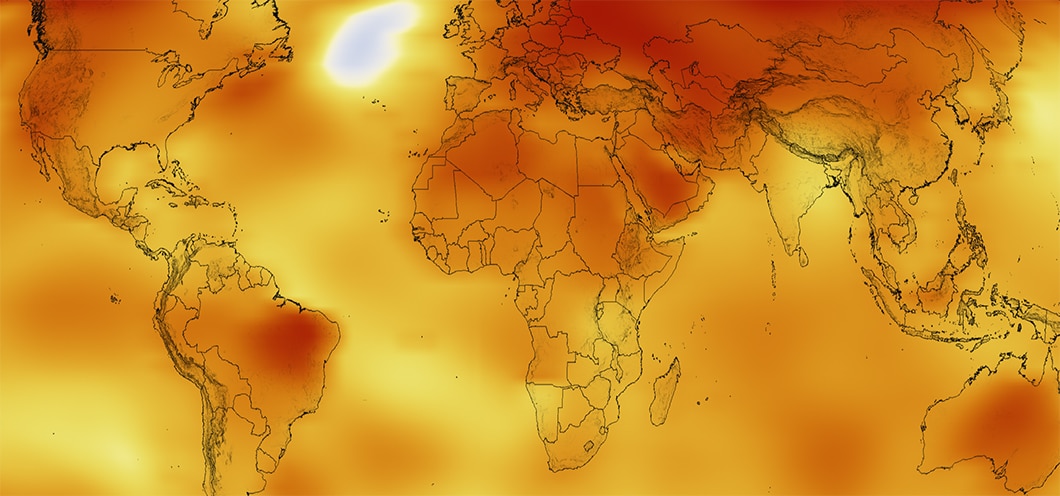
Research from Yale University shows that climate science literacy is unrelated to public acceptance of human-caused global warming.
Deep public divisions over climate change are unrelated to differences in how well ordinary citizens understand scientific evidence on global warming, according to a new study published by Professor Dan Kahan.
In fact, members of the public who score the highest on a climate-science literacy test are the most politically polarized on whether human activity is causing global temperatures to rise.
These were the principal findings of a Yale-led study published recently in the journal Advances in Political Psychology. In the study, a nationally representative sample of 2,000 U.S. adults completed a test measuring their knowledge of prevailing scientific consensus on the causes and consequences of climate change. They also indicated whether they believed that human activity is responsible for global temperature increases in recent decades.
Consistent with national opinion surveys generally, the study found that the American public is split on the existence of human-caused climate change.
“The study participants were deeply divided along partisan lines, with about 50% saying they do believe in human-caused climate change and 50% saying they don’t,” said Kahan, the Elizabeth K. Dollard Professor of Law and Professor of Psychology at Yale Law School and the lead researcher on the study.
Disagreement did not diminish, however, as the study subjects’ climate-literacy test scores increased. On the contrary, “those with the highest scores were even more politically polarized,” Kahan said.
The climate-science literacy test consisted of questions derived from reports issued by the U.N.’s Intergovernmental Panel on Climate Change and by the U.S. National Oceanic and Atmospheric Administration and the National Aeronautics and Space Administration.
“Generally speaking,” said Kahan, “both those who accept human-caused climate change and those who don’t displayed very poor comprehension of climate science.” For example, he said, most participants recognized that carbon dioxide increases global temperatures, yet mistakenly indicated that rising levels of atmospheric CO2 are expected to “reduce photosynthesis in plants.”
“If you know carbon dioxide is a ‘greenhouse gas’ but think it kills the things that live in greenhouses, then it’s safe to say you don’t know much about climate science,” said Kahan.

Regardless of whether participants said they accepted that human activity caused climate change, most recognized that scientists expect climate change to create serious environmental dangers, including increased coastal flooding. However, the vast majority of study participants also associated global warming with risks wholly contrary to scientific evidence, such as an increase in the incidence of skin cancer.
Study participants who scored highest on a general-science-literacy test did the best on the study’s climate-literacy test. But contrary to the researchers’ expectations, those participants were not more likely to agree on whether human activity is causing climate change, according to the study.
“Despite consistently giving the correct answers to climate-literacy questions,” Kahan noted, “the most science literate study participants were even more politically polarized.”
Previous studies, Kahan said, have found the more science-literate members of the public are more polarized. “Nevertheless, one might reasonably have supposed that those individuals must at least differ in their levels of climate-science literacy, maybe because of biased interpretations of the evidence. But apparently that’s not what’s going on,” said Kahan.
Kahan dismissed as “ridiculous” the suggestion that the study implies there is no value in climate education. “We need even more research on how to communicate climate science effectively, so people can make informed individual and collective decisions,” he said.
Nevertheless, Kahan said the results justify reassessing at least some popular common science-communication strategies. “One conclusion is that it’s misguided to fixate on what percentage of the respondents in an opinion survey say they ‘believe in’ climate change,” said Kahan. “What people say they believe about global warming is not a measure of how much they know, or even how worried they are about it; it is an expression of their cultural identities.”
According to Kahan, the study also casts doubt on the value of social-marketing campaigns that feature the message that “97% of climate scientists” accept human-caused climate change.
“Republicans and Democrats alike already understand that climate scientists have shown we face huge risks from global warming,” said Kahan. “Just telling people that over and over — something advocacy groups have been spending millions of dollars doing for over a decade — misses the point: Positions on climate change have become symbols of whose side you are on in a cultural conflict divorced from science.”
“That’s what has to change if as a society we are going to make use of all we know about the dangers we face and how to abate them,” he added.
Kahan pointed to the success of local political leaders in southeast Florida in depoliticizing discussions of climate science, an example that is discussed at length in the study.
The study was sponsored jointly by the Cultural Cognition Project at Yale Law School, the Annenberg Public Policy Center of the University of Pennsylvania, and the Skoll Global Threats Fund.
Provided by Yale Law School